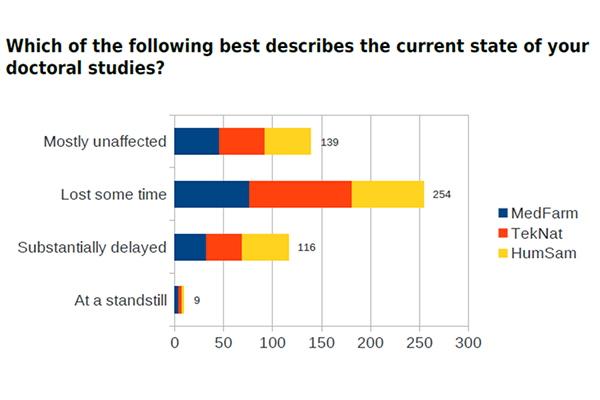Many doctoral students responded that they have been unable to carry out field work, collect data or find participants for their studies. Nearly half of the respondents have been unable to present their research and 150 doctoral students responded that teaching and administration have taken more time.
“Just as for other fixed-term posts, doctoral studentships are vulnerable to delays and extra work outside their research projects,” says Oliver Degerstedt, chair of the Doctoral Board and doctoral student at the Department of Pharmaceutical Biosciences. “As doctoral students, what makes us particularly vulnerable is precisely that we are completing a programme of study and have the right to only four years’ actual period of study with a focus on research.”
The survey was conducted online from October to December 2020. All of the over 2000 doctoral students at Uppsala University received the survey and just over 500 responded. The situation for the respondents seems to be fairly similar across all three disciplinary domains.
Additional time needed
Around seven per cent responded that they need twenty or more weeks of additional time to catch up on the time lost during the pandemic. However, some respondents indicated a need for fewer weeks of additional time: 100 doctoral students calculated that they need five additional weeks.
“The most common and simplest tool is to lengthen the programme – an extension in other words. However, we also see a need to highlight once again the tools for stress management and mental health available to doctoral students via the occupational health service, Previa.”
One of the questions doctoral students were asked in the survey was whether they have received or expect to receive an extension or other forms of support to manage the impacts of the pandemic. It was a free-text question and just under 200 responses to it could be categorised as ‘no’, just over 60 as ‘yes’ and just over 60 as ‘don’t know’.
Dialogues in progress
Dialogues and work are currently in progress to review the issue of extensions for doctoral students due to the pandemic.
“However, the discussions are progressing slowly. The positive thing is that there are dialogues happening at different levels. Unfortunately, the situations described by the doctoral students, heads of department and the Deans differ quite a lot across the University and there are quite stark differences in certain faculties. The Doctoral Board is therefore calling for transparency in how the temporary funding allocated to the faculties during 2021 is to be distributed and used. According to a Vice-Chancellor’s decision in December 2020, this funding is earmarked to help manage the negative effects of COVID-19 on research and doctoral education. If a doctoral student’s application for an extension is refused, the decision ought to also clearly state why the application was refused and how the doctoral student can proceed to an appeal.”
Oliver Degerstedt also hopes that supervisors are providing support and being extra vigilant due to the situation that has arisen.
“Above all, it is important that supervisors remain vigilant and assist by providing support to those doctoral students who have had to completely change the focus of their projects, as well as to those who have recently begun their doctoral studentships and perhaps been unable to settle into an optimal research environment due to working remotely.”
